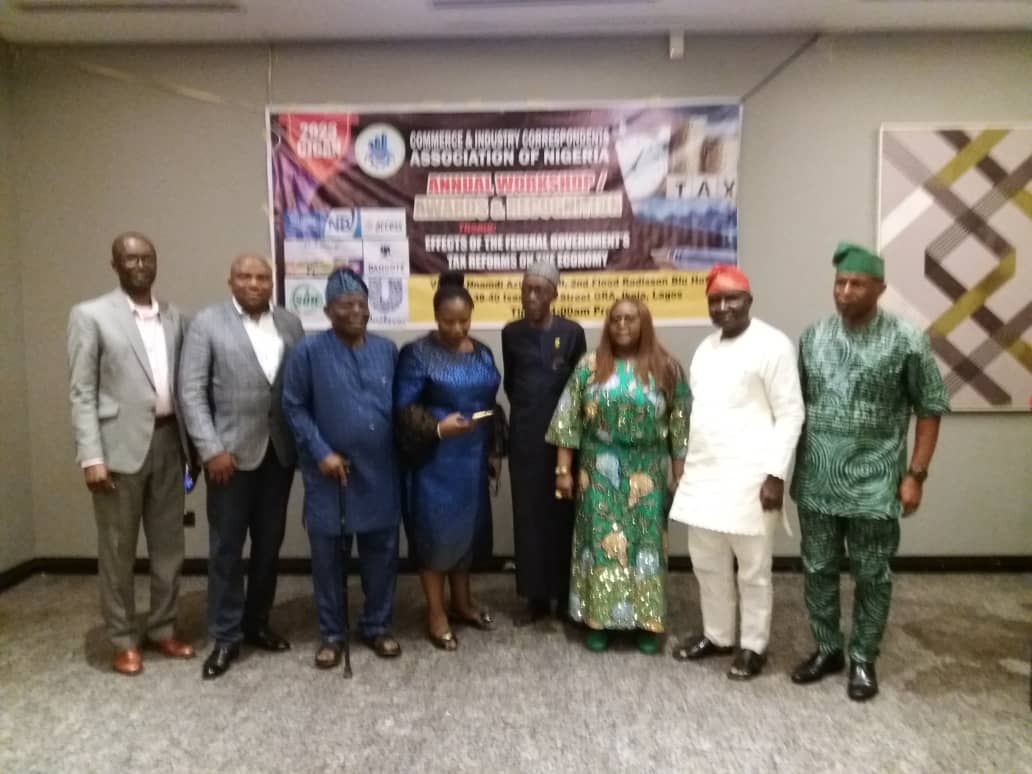The federal government through the Federal Inland Revenue Service (FIRS) has announced plans to detect tax Evaders, recover lost revenues and prevent tax leakages through improved tax enforcement schemes.
The Executive Chairman, FIRS, Zacch Adedeji, stated this at the annual Commerce and Industry Correspondents Association of Nigeria (CICAN) annual workshop awards and recognition themed “Effects of the federal government’s tax reforms on the economy”
According to Adedeji, the move is coming on the heels of the pronouncement of the federal government’s desire to raise tax to Gross Domestic Product (GDP) ratio to 18 per cent in the next three years without having to impose additional tax burden, saying this would be achieved through the use of tax laws to boost compliance.
The FIRS boss who was represented by the Director and Coordinator, Lagos Island FIRS, Oyeniyi Fadekemi, said the success of the reforms relies not only on the government but also on the active participation and cooperation of the business community.
“We call upon all stakeholders to embrace these reforms, fulfill their tax obligations, and work hand in hand with the government in achieving our common goal of building a strong and resilient economy,” he noted.
He reaffirmed the Service’s commitment to creating a level playing field for all taxpayers and recognizing the importance of combating tax evasion and ensuring that everyone pays their fair share of taxes.
Adedeji noted that taxation is the lifeblood of any economy, as it provides the necessary funding for government to carry out its functions and implement policies that foster growth and development.
He pointed out that it is, therefore, imperative that Nigeria’s tax policy reforms are effective, fair, and encourage investment and innovation adding that over the years, Nigeria has recognized the need for tax policy reforms to address the challenges faced by businesses and create an enabling environment for economic growth.
In his words, “It is instructive to note that part of the Renewed Hope Agenda of President Bola Ahmed Tinubu is to reform the tax system. On assumption of office, he set up a Presidential Committee on Fiscal Policy and Tax Reforms headed by Taiwo Oyedele with other eminent Nigerians representing various institutions and professional bodies with the mandate to reform the tax ecosystem,” he added.
“This reform is expected to lead to fiscal discipline, remove all impediments in our tax system, and eliminate the ambiguity in our tax laws that will culminate in the ease of doing business which will ultimately lead to improved revenue generated from taxes.”
Adedeji said another critical aspect of the government’s tax policy reforms is the promotion of voluntary compliance, stressing that rather than resorting to punitive measures, the federal government believes in fostering a culture of voluntary tax compliance through educational campaigns, awareness programmes, and taxpayer support services.
“By engaging with taxpayers and providing them with the necessary tools and information, a high level of compliance rate is expected to happen. This will in turn help in building trust between the government and the business community,” he said.
“As you are aware, the Oyedele-led Committee made a number of recommendations that will help businesses in the report it presented to the President recently.
“Some of these recommendations include the suspension of VAT on diesel and tax waiver on compressed natural gas conversion and renewable energy items; simplifying withholding tax to ease pressure on the working capital of businesses;
“suspension of multiple taxes that constitute a burden on poor and small businesses; waiver of penalty and interests upon full payment of outstanding tax liabilities on or before December 31, 2023. When implemented, these suggestions will go a long way in helping businesses within the country.
“This not only enhances the integrity of our tax system but also ensures that compliant taxpayers are not disadvantaged by those who evade their tax obligations,” he said.
“The tax policy reforms being implemented by the Federal Inland Revenue Service (FIRS) is vital for Nigeria’s business environment. These reforms will enhance revenue generation, attract investment, promote economic growth, and ultimately improve the quality of life for all Nigerians,” he averred.
He commended the Commerce and Industry Correspondents Association of Nigeria (CICAN) for organizing the conference and providing a platform to discuss such critical issues. Together, let us strive for a vibrant and prosperous Nigeria, where businesses thrive, and our citizens can fulfill their potential.
Also speaking, the Director General, Manufacturers Association of Nigeria (MAN), Segun Ajayi-Kadir, said the organization’s vision to be the key driver of industrialization, sustainable economic growth and development in Nigeria has been the thrust of the services it offers to manufacturers in Nigeria.
Earlier in his welcome address, the CICAN National Chairman, Charles Okonji, said tax policies are critical for Nigeria’s growth and development, calling on the federal government to urgently review its tax policies to attract potential investors and those who have relocated outside the shores of the country due to the harsh business terrain.









Comment here